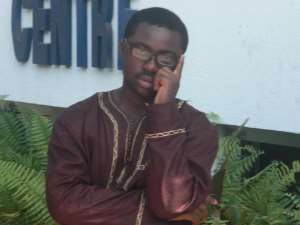
“No matter how tall the Iroko tree grows, it can never reach the sky”- (Nigerian proverb)
The Brazilian premier, Dilma Rousseff, was last Friday elected in what will go down into the annals of history as the first female president Latin America's biggest nation. The United State of America's mid-term which also occurred last week has being registered in the country's archive as a historic one. Although there is no such thing as a perfect election arrangement any where in the world, one can certainly not go blind to the peaceful and tension free atmosphere that engulfed both elections. The success of these democratic experiments is in no uncertain terms traceable to the electronic voting system which has proven to be at least a better option above the paper ballot system.
If democracies in the third world are to succeed, then it requires answers to the fundamental instrument of rigging that undermines it. Anyone who has taken a careful look into Appiah Menkah's book; “HOW GHANA CAME CLOSE TO A CIVIL WAR”; which recounts how a cabal of self seeking crooks, decided to hijack our democracy to private end, during the 1992 elections will realize one predictable trait; That in Ghana's volatile and charged political environment, it is extremely important that we have a trusted election process, where elections will be regarded as reasonably fair, even by the loosing side. It is as a result of this that it has becoming very necessary that Ghana begins to make serious considerations to transplant this democratic culture into her garden in order to save her from the near collapse experience which has over the years characterized most elections on the continent.
The true notion of majoritarian rule in a democracy is often made mockery of by the electoral posture in our country which manifest in the high rejected ballots after an election. Yet the same cannot be said of what pertains during the electronic voting. The Philippines elections on the 10th of May this year, which used the electronic voting, speak volumes for itself. Official tally by the country's electoral body; COMELEC showed that; 29,018,156 votes represented 100% of valid votes cast. Thus If such a huge size population has being able to make it, then nothing should hinder Ghana , a country whose population size is over two times smaller as compared to that of the Philippines.
The resource of this country is another area which we must all take keen interest and opt for the electronic system of voting. The 2008 presidential elections is a typical case in point. The research and monitoring department of the electoral commission on the first round of elections stated that, out of a total of 8,671,272 votes cast; 8,465,832 were valid. The 205,438 rejected ballots represented 2.4% of total votes cast. The then NPP flag bearer, Nana A.D Akuffo-Addo obtained 4,159,439 representing 47.92% as against the then NDC candidate; J.E.A Mills' 4,056,634 votes which represented 47.92%.The percentage difference between the two candidates was a slim margin of 1.21% less than the 2.4% of ballots rejected. By simple arithmetic therefore, Ghana would not have gone to the polls and thus not wasted state resources if the NPP should have obtained 45.83% or above of the rejected ballots. With 87.5% of the rejected ballots, the NDC could have also prevented us from going to the polls again. And the money for the second round would have being channeled into other sectors of the economy.
Peace and stability in the in the country is another area which e-voting brings to the table. During this year's elections in Philippines; with a population of 50.7 million people, and voting closing at 7pm , two thirds of the results which represented 6 7% of certified electoral results, were known by 10pm. Same can be said of the Brazilian election starting at 10.00GMT and closing at GMT20.00 and producing majority of results the same day.
As Africa's shining star and beacon of hope, Ghana cannot afford to loose her hard-won reputation. Hence it is about time we test the waters for this mode of electing our leaders which presents other several advantages. It's our time, or as they say in Afrikaans; 'Ke Nako'
The writer is the leader of Orange Education Ghana and a member of the African leaders' project of the African leadership Academy based in Johannesburg, South Africa.
Learn more: oeghana.blogspot.com email:[email protected]




 There’s nothing you can do for us; just give us electricity to save our collapsi...
There’s nothing you can do for us; just give us electricity to save our collapsi...
 Ghanaian media failing in watchdog duties — Sulemana Braimah
Ghanaian media failing in watchdog duties — Sulemana Braimah
 On any scale, Mahama can't match Bawumia — NPP Youth Organiser
On any scale, Mahama can't match Bawumia — NPP Youth Organiser
 Never tag me as an NPP pastor; I'm 'pained' the 'Akyem Mafia' are still in charg...
Never tag me as an NPP pastor; I'm 'pained' the 'Akyem Mafia' are still in charg...
 Your refusal to dedicate a project to Atta Mills means you never loved him — Kok...
Your refusal to dedicate a project to Atta Mills means you never loved him — Kok...
 2024 elections: I'm competent, not just a dreamer; vote for me — Alan
2024 elections: I'm competent, not just a dreamer; vote for me — Alan
 2024 elections: Forget NPP, NDC; I've the Holy Spirit backing me and nothing wil...
2024 elections: Forget NPP, NDC; I've the Holy Spirit backing me and nothing wil...
 2024 elections: We've no trust in judiciary; we'll ensure ballots are well secur...
2024 elections: We've no trust in judiciary; we'll ensure ballots are well secur...
 Performance tracker: Fire MCEs, DCEs who document Mahama's projects; they're not...
Performance tracker: Fire MCEs, DCEs who document Mahama's projects; they're not...
 Train crash: Railway ministry shares footage of incident
Train crash: Railway ministry shares footage of incident
